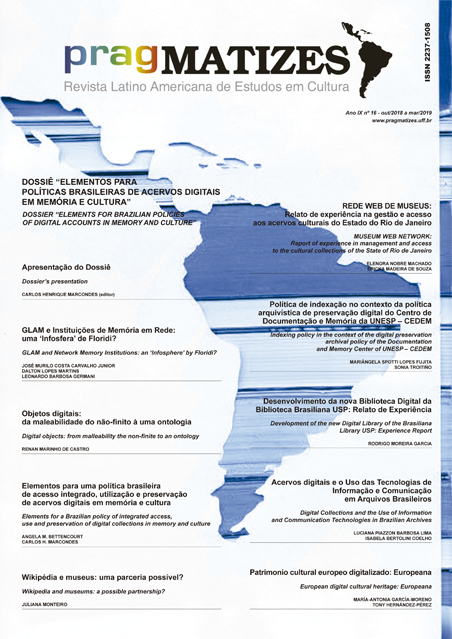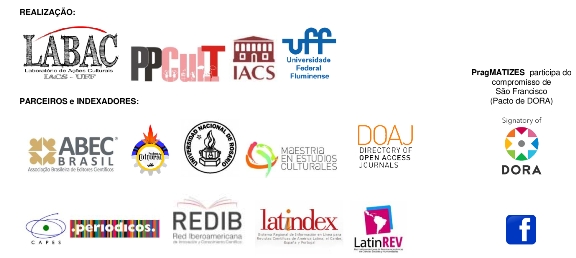Digital objects: from malleability the non-finite to an ontology
DOI:
https://doi.org/10.22409/pragmatizes.v0i16.27519Abstract
This text presents the digital objects and their impact to information
units using the case study of the Getulio Vargas Foundation (FGV /
CPDOC) Center for Research and Documentation of Contemporary
History of Brazil. It briefly highlights the impact of technologies on the
contemporary social, and its influence on the transformations observed
in the informational field. It points out the need for a reflection on the
impact of digitized and digital documents on their core by the Information
Units, since with the creation of a mass of digital, it is promoted a
malleability that traditional supports of physical nature do not support.
It conceptualizes the born-digital and highlights it as being an element
capable of renewing the entire informational logical chain. It analyzes
the consultation data to the CPDOC collection, according to the most
visited collections in the period from 2010 to 2016, highlighting the
impact on the number of accesses from the availability of digital copies
of the collections. It points to the ontology of digital as a possibility of
appropriation of information and its repercussions in the context of the
technological revolution.
Downloads
References
CASTELLS, Manuel. A Sociedade em Rede. Editora Paz e Terra, 2000.
EVENS, Aden. Web 2.0 and the Ontology of the Digital. Digital Humanities Quarterly, v.6, n.2, 2012
HUI, Yuk. What is a Digital Object? MetaPhilosofhy: Special Issue: Philoweb: Toward a Philosophy of the Web. V.43, n.4, Jul, p.380-395, 2012
KALLINIKOS, Jannis; AALTONEN, Aleksi; MARTON, Attila. A theory of digital objects. First Monday, v. 15, n. 6, 2010. Disponível em: < http://firstmonday.org/ojs/index.php/fm/article/view/3033/2564> . Acesso em: 17 abr. 2018.
KIRSCHENBAUM, Matthew. The .txtual Condition: Digital Humanities, Born-Digital Archives, and the Future Literary. Digital Humanities Quarterly, v.11, n.3, 2013
MARQUES, Lilian Emanueli ; PINHEIRO, Marta Macedo Kerr. A CÚPULA MUNDIAL SOBRE A SOCIEDADE DA INFORMAÇÃO: foco nas políticas de informação. Inf. & Soc.:Est., João Pessoa, v.23, n.1, p. 117-131, jan./abr. 2013
MCCARTY, W. “Humanities Computing.” In: Encyclopedia of Library and Information Science. New York: Marcel Dekker. 2003
MORAIS, E. A.; AMBRÓSIO, A. P. L. Mineração de Textos. Relatório Técnico. Instituto de Informática; Universidade Federal de Goiás, 2007. Disponível em: < http://www.inf.ufg.br/sites/default/files/uploads/relatorios-tecnicos/RT-INF_005-07.pdf>. Acesso em: 02 jun. 2017.
MUHANNA, Elias. What Does “Born Digital” Mean? International Journal of Middle East Studies, v.50, n.1 Feb 2018, p. 110-112
NOLASCO, Diogo; OLIVEIRA, Jonice. Modelagem de tópicos e criação de rótulos: identificando temas em dados semi-estruturados e não-estruturados. In: OGASSAWARE, Eduardo; VIEIRA, Vaninha (Orgs.).Tópicos em gerenciamento de dados e informações. 1. ed. Salvador: Sociedade Brasileira de Computação, 2016. cap. 4, p. 87-112. E-Book. ISBN 978-85-7669-344-4. Disponível em: < http://sbbd2016.fpc.ufba.br/e-book/minicursos.pdf>. Acesso em: 02 jun. 2017.
ROSS, Lyman; SENNYEY, Pongracz. The Library is Dead, Long Live the Library! The Practice of Academic Librarianship and the Digital Revolution. The Journal of Academic Librarianship, v. 34, n.2, p. 145–152
THIBODEAU, K. Overview of Technological Approaches to Digital Preservation and Challenges in Coming YearsThe State of Digital Preservation: An International Perspective. Anais...Washington: CLIR and Library of Congress, 2002
VARELA, Aida Varela. A explosão informacional e a mediação na construção do conhecimento. ENCONTRO NACIONAL DE PESQUISA EM CIÊNCIA DA INFORMAÇÃO (ENANCIB), 6., 2005, Florianópolis, SC. Disponível em <http://enancib.ibict.br/index.php/enancib/vienancib/paper/viewFile/1755/896> Acesso em 7 set 2018.
YAMAOKA, Eloi Juniti; GAUTHIER, Fernando Ostuni. Objetos digitais: em busca da precisão conceitual. Inf. Inf., Londrina, v.18, n.2, p.77-97, maio/ago. 2013.
Downloads
Published
How to Cite
Issue
Section
License
By forwarding an original to PragMATIZES, the authors agree that the copyright related to it is transferred to the Publishing. Articles and other writings are made available in PDF format from their publication, and they can be downloaded to institutional repositories and personal pages, provided that with their proper bibliographic indication.



